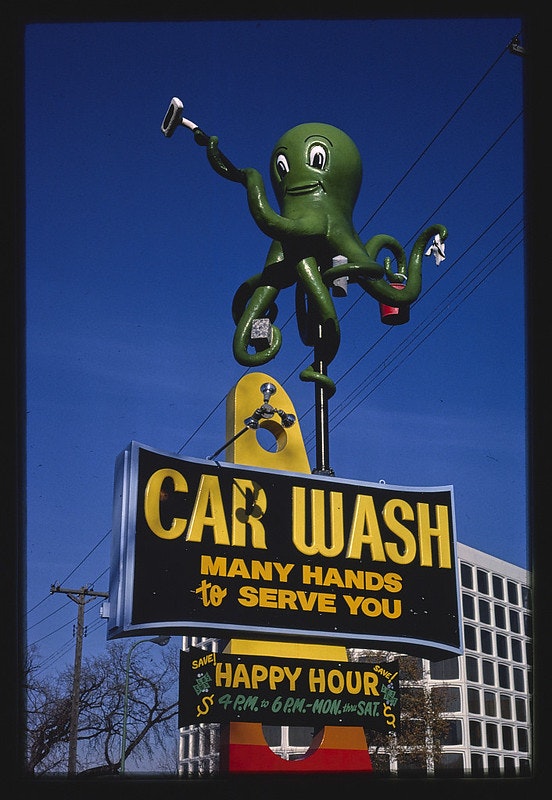An ongoing dialogue on HIV/AIDS, infectious diseases,
September 3rd, 2021
No, COVID-19 in Anti-Vaxxers Does Not Make Me Happy

Octopus Car Wash, Minneapolis, Minnesota; 1981. John Margolies’ Photographs of Roadside America (public domain).
High-profile people who deny the seriousness of COVID-19, or strongly oppose vaccination, also contract — and sometimes succumb — to the disease.
Surprise, surprise.
The list is long, but recently has included a group of well known conservative radio hosts. Broadcaster Marc Bernier from Daytona Beach, Florida, died of COVID-19 recently.
Bernier called himself “Mr. Anti-Vax”, so it follows logically that he was not shy about expressing his opinions. His last statement on social media compared government advice that people get vaccinated to Nazism.
He was dead less than a month later.
This week, Joe Rogan, a famous podcaster who explicitly discouraged vaccination among young healthy people, announced that he has the disease.
Unlike Bernier, Joe Rogan is recovering (at least as of his last communication). For treatment of COVID-19, he “threw the kitchen sink at it.”
While we might think that someone who refuses vaccination would take the same “natural” approach to therapy — allowing the body’s healing processes to save him without exogenous help — think again. He received monoclonal antibodies (a good move), ivermectin (shrugs), azithromycin (doesn’t work), prednisone (can make mild COVID-19 worse), an “NAD drip” (huh?) and a “vitamin drip” (available now pretty much everywhere).
Best V.I.P. treatment that money can buy! But for the record, our taxpayer dollars are paying for the one thing that probably helped, the monoclonals.
What I find fascinating about these cases of COVID-19 in disease-deniers and anti-vaxxers is our response — as a society in general and as ID doctors in particular.
If one reads the comments on line or on social media, here are some of the common attitudes:
- Anger. They got what they deserve.
- Glee. Schadenfreude in its purest form.
- What a waste. It’s unfair they take up limited resources for treatment.
- Natural selection. It’s Darwinian evolution playing out.
- A weary sadness. I just … can’t anymore.
It’s this last one — sadness — which overwhelmingly dominates ID doctors’ response. Some examples:
Deep sadness and ‘If only’– for them, their families and countless followers and their families …Sadness. Also validation. Followed by sadness about the validation … I will admit to feeling a sense of karma, but mostly it is just more and more sadness … Sad and powerless … Very depressed. It makes the weight of the last 18+ months heavier and heavier and it’s difficult to know how much more we can carry …When I think of their sphere of influence and their many unvaccinated followers’ deaths, which aren’t reported, it makes me incredibly sad …
At its most extreme, it’s a numb feeling, as highlighted here:
My emotional response is I can’t afford to have an emotional response. I just keep going. #IDTwitter. https://t.co/J9TSR3sf4T
— Jo Hofmann (@JoHofmann2) August 29, 2021
So don’t ask us if we’re glad to hear about another anti-vaxxer getting COVID. We’re not glad.
We’re very, very sad — and tired, too.


A typical “anti-vaxxer” is the victim of a worldwide disinformation campaign. A foolish choice, yes, but so is it foolish for me to eat ice cream, and you’ll still take care of me when I have an MI. (And I know better.)
That said, it’s tougher to sympathize with disinformation superspreaders like Mr. Bernier, whose lies kill people. That he is the victim of his own lies is akin to an arsonist getting burned in the fire he started. Most of us have taken care of such people. There’s little moral satisfaction in it.
Completely agree – I have yet to meet the beacon of health that always makes the optimal “healthy” choice when such choices present themselves. Akin to personal finance, there is no perfectly rational investor (Kahneman, et al on behavioral economics).
Tough to find grace during the onslaught but I echo your sentiment above.
I appreciate your intelligent and compassionate thoughts, Dr. Sax.
As a physician, I never wish for anyone to get sick or die. In this situation, I feel the same, but look at this in the big picture as a bizarre form of Darwinian evolution. Regardless, it is sad and we should try very hard to keep this from happening again.
I have to admit to an initial reaction of something like “NOW do you believe that we need to take this seriously?” followed quickly by dismay that I felt this way. It is actually disorienting to have such mixed feelings when the more considered response is to feel sad at the loss of another life to the coronavirus. The issue of anger at purveyors of disinformation clearly plays a role too….